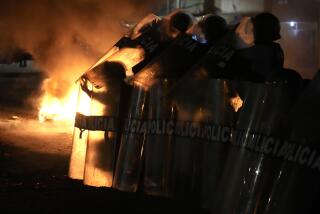Religious Rights Panel Blasts Administration
- Share via
WASHINGTON — Despite giving lip service to the cause of religious freedom, the Clinton administration has been extremely timid in its enforcement of a 2-year-old law imposing sanctions on governments that practice or condone faith-based persecution, a federal watchdog commission said Friday.
The U.S. Commission on International Religious Freedom, a bipartisan and multireligious panel, complained that the administration imposed only trivial penalties on seven regimes considered to be the worst offenders and refused to add countries to the list despite well-documented atrocities.
Commission Chairman Elliott Abrams said only one of the seven countries, China, is a major player in international politics. The others are “rogue states” that already are on U.S. sanction lists for other offenses. He said the sanction against China, a ban on export of “law enforcement equipment,” was so mild that it was meaningless.
The administration rejected the commission’s call for sanctions against Saudi Arabia, Laos, North Korea and Turkmenistan. Four other governments--India, Pakistan, Uzbekistan and Vietnam--are guilty of religious persecution that could warrant sanctions if it gets much worse, the commission said.
Besides China, the administration’s list of most egregious violators of religious freedom included Myanmar, Iran, Iraq, Sudan, the Taliban regime in Afghanistan and former President Slobodan Milosevic’s Yugoslavia. Abrams said it was “cheap” for the administration to list those regimes because Washington has had almost no dealings with them. The addition of Saudi Arabia, India and Pakistan would carry a far higher diplomatic price, he said.
But, Abrams said, when Congress passed, and President Clinton signed, the 1998 International Religious Freedom Act, “they were saying that they are prepared for a bit of trouble” in opposing religious atrocities.
Abrams said that Clinton’s rhetoric on human rights and religious freedom has been commendable and that the State Department has done an effective job in reporting on religious persecution worldwide.
“The problem is what the State Department and the administration do with the information they have so carefully cataloged,” he said.
He said the commission had hoped to discuss its mandate with the incoming president but has been unable to do so because of the Florida ballot challenge. Abrams, a State Department official in the Reagan administration, said concern over religious persecution cuts across party lines.
The commission said the administration’s response to atrocities in Sudan was entirely inadequate even though Clinton acknowledged Thursday in a Human Rights Day statement that slavery is practiced in Africa’s largest country.
The commission said it had received credible information from the Anglican and Roman Catholic bishops in Sudan that the Muslim-dominated government was trying to force Christians to convert to Islam by withholding food and other aid provided by the United Nations and the United States to the famine-ravished country. The report said that the commission had asked White House National Security Advisor Samuel R. “Sandy” Berger to investigate the allegations but that there was no indication that he had done so.
However, Abrams and another commission member, Nina Shea, praised Susan E. Rice, the assistant secretary of State for African affairs, for a recent visit to southern Sudan, where she conferred with mostly Christian opposition leaders and met several people who claimed to be former slaves.
“This is the kind of thing we are calling for,” Abrams said of Rice’s trip. “It is a tremendous signal to the government of Sudan that senior officials are taking this seriously.”
More to Read
Sign up for Essential California
The most important California stories and recommendations in your inbox every morning.
You may occasionally receive promotional content from the Los Angeles Times.












